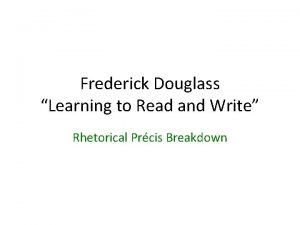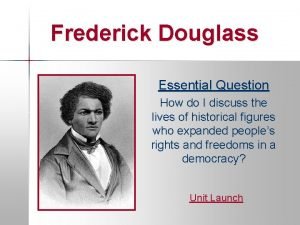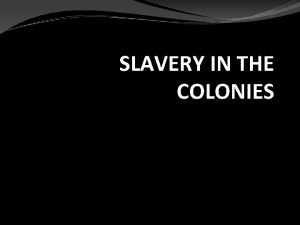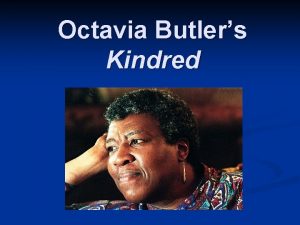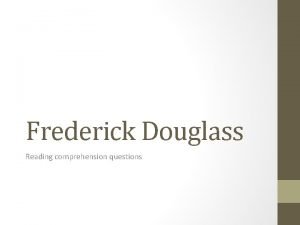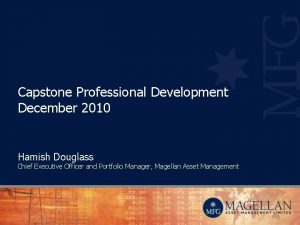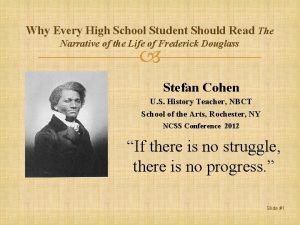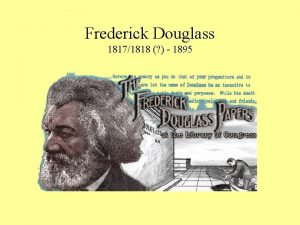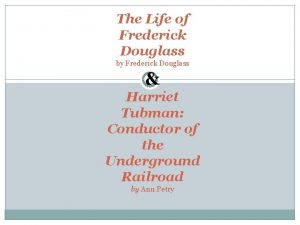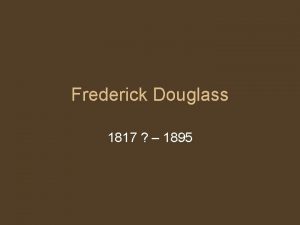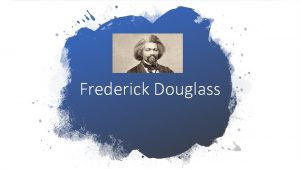Frederick Douglass Life and Career Douglasss Early Life


![Slave Narratives as American Literature [T]here is one portion of our permanent literature, if Slave Narratives as American Literature [T]here is one portion of our permanent literature, if](https://slidetodoc.com/presentation_image_h/0d4e58d0a57df7116b361f102fe1bd8b/image-3.jpg)






- Slides: 9

Frederick Douglass Life and Career

Douglass’s Early Life • Born in 1818 on Maryland’s eastern shore • His mother was a slave; his father an unknown white man (possibly his master) • At age eight he worked as a house servant in Baltimore, where he learned to read • At age twenty he fled to Massachusetts • By 1841 he was delivering speeches about his life story at antislavery conventions
![Slave Narratives as American Literature There is one portion of our permanent literature if Slave Narratives as American Literature [T]here is one portion of our permanent literature, if](https://slidetodoc.com/presentation_image_h/0d4e58d0a57df7116b361f102fe1bd8b/image-3.jpg)
Slave Narratives as American Literature [T]here is one portion of our permanent literature, if literature it may be called, which is wholly indigenous and original. . . I mean the Lives of Fugitive Slaves. . . [A]ll the original romance of Americans is in them, not in the white man’s novel. —Theodore Parker, from “The American Scholar” (1849)

Douglass’s rise to prominence William Lloyd Garrison took Douglass under his wing soon after he made his way to freedom. Douglass delivered speeches for Garrison at antislavery conventions and contributed to the Liberator. Douglass become representative of the African American experience and of abolitionism in particular. This poster adversises a song composed in honor of Frederick Douglass in 1845

Literacy and the Narrative Very soon after I went to live with Mr. and Mrs. Auld [in Baltimore], she very kindly commenced to teach me the A, B, C. . . Mr. Auld found out what was going on, and at once forbade Mrs. Auld to instruct me further. . . “Now, ” said he, “if you teach [Douglass] how to read, there will be no keeping him. It would forever unfit him to be a slave. ” (Narrative, Chapter 6)

Literacy and the Narrative • Learning to read with the aid of poor white children in Baltimore • trading bread for reading lessons • tricking them into teaching him • Reading The Columbian Orator • “Dialogue Between a Master and Slave” • Sheridan’s speeches for Irish independence

Physical Struggle “This battle with Mr. Covey was the turning-point in my career as a slave. It rekindled the few expiring embers of freedom, and revived within me a sense of my own manhood. . . It was a glorious resurrection, from the tomb of slavery, to the heaven of freedom. . . [H]owever long I might remain a slave in form, the day had passed forever when I could be a slave in fact. ” (Narrative, Chapter 10)

Friendship and Social Bonds • “It was to those little Baltimore boys that I felt the strongest attachment. ” (Chapter 8) • “I was. . . indebted to the society of my fellowslaves. . . We were linked and interlinked with each other. ” (Chapter 10) • “Our confidence in each other was unshaken. We resolved to succeed or fail together. ” (Chapter 10)

Eloquence “Our house stood within a few rods of the Chesapeake Bay, whose broad bosom was ever white with sails from every quarter of the habitable globe. . . I would pour out my soul’s complaint, in my rude way, with an apostrophe to the moving multitude of ships: —‘You are loosed from your moorings, and are free; I am fast in my chains, and am a slave!’” (Narrative, Chapter 10)
 Learning to read and write frederick douglass
Learning to read and write frederick douglass Harriet jacobs and frederick douglass
Harriet jacobs and frederick douglass Map of frederick douglass escape route
Map of frederick douglass escape route Frederick douglass brainpop
Frederick douglass brainpop Cow toungue
Cow toungue Talbot county maryland frederick douglass
Talbot county maryland frederick douglass Frederick douglass comprehension questions
Frederick douglass comprehension questions Hamish and alexandra douglass
Hamish and alexandra douglass Early cpr and early defibrillation can: *
Early cpr and early defibrillation can: * Anna murray-douglass
Anna murray-douglass
